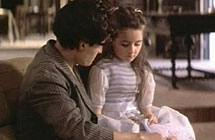|
|
|
|
The
House of the Spirits
|
 |
|
I presume this much comes from Isabel Allende's novel: a system of world history where the male domain is exploitative capitalism, rape, murder, violence, revenge ... and, above all, politics (which seems to contain all the rest in an infernal cycle) – while the woman's world is spirits, love, family, nurturing and healing of the wounds inflicted by men. This leaves little space for women in politics, or on the stage of world-political history (except as its tortured, ravaged victims): Blanca (Winona Ryder), at the end, opts out of it for the sake of "life" (her husband, family, the future); and Clara (Meryl Streep) talks airily of a cosmic principle of "change" (not the old, crusty ways of the conservatives) – and even more airily of the "relationship between all things", presumably personal and political things, when there is only a schism between these realms, as promulgated by the fiction itself! Despite all this, the grand arthouse soap opera – everything is family, bastard sons, brave daughters, excluded sisters – jerks an undeniable affect from the viewer. Even though August's direction is no more than classy television mini-series stuff, with a slight touch of Bergmanesque solemnity – but really very poor editing, and some awful casting/acting: Irons, Streep, Ryder ... plus Vincent Gallo (!) in a terribly one-dimensional Bad Seed role, and Antonio Banderas, charismatic but also pretty simple. There are no bad women (but very many bad men!) in this saga of history – and no perversity to normal sexual desire (distinct from Gallo's deviance) either, despite what comes up in the confessional scene (but rechannelled into a line about the "miracle" of contraception). Glenn Close is, in fact, one of the best things in the film, in her dark, brooding seclusion. The paradox of magic realism: as in Queen of Hearts (1989), the magic only really affects the periphery of the fiction (a levitation here, a premonition there, a talking animal) – for, especially in a saga like this that is set against a backdrop of real history, it can never be pretended that the "magic spirits" ever actually have a real effect, a real bearing on events. Clara cannot will a mad General to death, for instance – that would alter the course of history! (It would be good if she could.) A terrible line: "Your father has no malice, just too much energy!" But at least she sticks to her guns and never speaks to him again after he hits her. All the awful stuff with the revolutionary peasants in a great uprising ... In this very aristocratic story there is, of course, no real relation between the protagonists and the real people of the earth (except for glamorous rebel Banderas). An absurd moment: the television cameras showing Esteban (Irons) alone in a conservative hall on election night! But there is an intriguing passage where he redeems himself by stooping to hide and rescue Pedro (Banderas). MORE August: Les Miserables © Adrian Martin March 1994 |
![]()